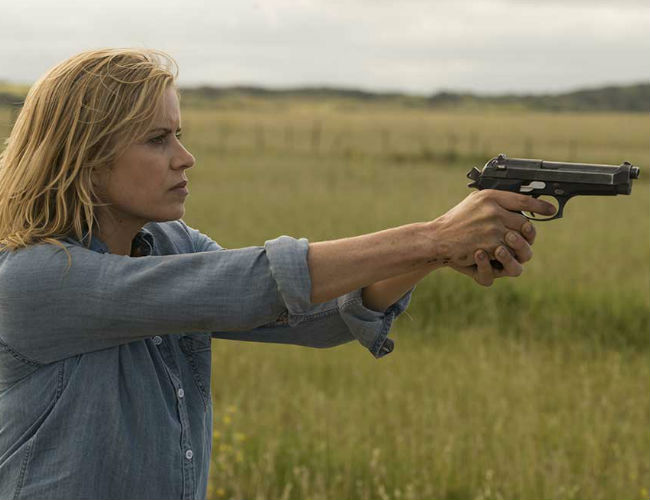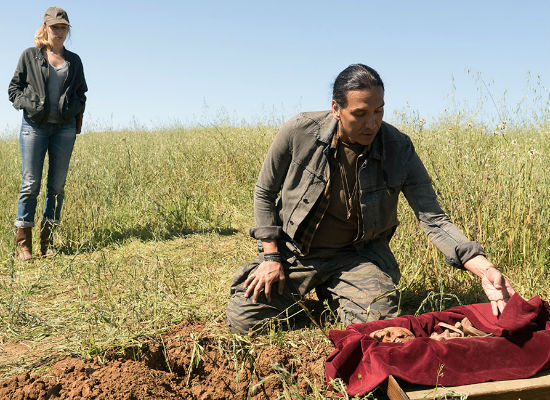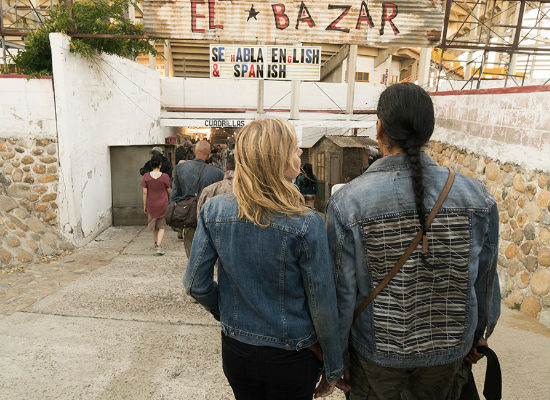
- SPOILERS AHEAD … AND SOME TECTONIC SHIFTS IN POWER … AND SHOPPING …YES SHOPPING
From the beginning – both of the show and the apocalypse it so brilliantly documents – Fear the Walking Dead has excelled at exploring what humanity is like under stress.
I mean, extreme, world-ending, civilisation-collapsing, everyone you know and love is gone, zombies are everywhere stress.
Unlike The Walking Dead, which has shown an increasing penchant for violence for the sake of violence, its philosophical soul rung dry, Fear has always kept a canny eye on the fact that while there will inevitably be some violence when the world ends since people aren’t that good at coping with the everything going royally to shit, humanity will also demonstrate an aspiration to be better in some way, regardless of how harrowing the circumstances become.
So it was again in the double-episode opener, “Minotaur” and “Diviner” where the Ranch, newly-devoid of its sole remaining co-founder Jeremiah (Dayton Callie) to “suicide” – *cough!* Nick (Frank Dillane) killed him! *cough!* Shhh don’t tell Troy (Daniel Sharman) – opened its gates to Qaletaqa Walker (Michael Greyeyes) and The Nation who claimed ownership of the land and were determined to have it back one way or another.
Part-idealism, part-hands-forced practicality – more of the latter than the former right Madison (Kim Dickens)? – it was a marriage of convenience with The Nation in dire need of the protection and resources of the Ranch, and Jake (Sam Underwood), the successor fairly certain none of the people under his care wanted to die.
It was that basic and that necessary and so two competing parties, pushed apart from some pretty big, continental-sized grievances, not all of them sourced from the apocalyptic imperative to go all Lord of the Flies and survive, ended up together.
They all lived, as you’d rightly expect, happily ever after.
Hahahahahaha … or not. Very much not.

It was not for want of trying to be fair.
While Madison, the power behind the throne, who back-channelled to Taqa like it was a U.N. summit on steroids, much to peacemaker Alicia (Alycia Debnam-Carey)’s disgust (she stuck firmly to idealism, partly because she believes in it, partly because what choice they have and to support her man, Jake), played a hard-nosed endgame, Jake, and yes even Taqa himself tried to make the uneasy new arrangements work.
No prizes for guessing that it was fraught from the start, but borne of a recognition that both parties really had no choice, they gave it a red-hot, kumbayah go.
Unfortunately in quick order, the sharing of responsibility for weapons devolved to Taqa controlling all the weapons and policing the Ranch which went down a treat with the conspiracy-addled racists, and the scarcity of water, something Jeremiah had kept well hidden, opened up the kind of fissures you’d expect in such a tense situation.
Surprisingly, or not surprisingly if you’ve paying any kind of attention to the nuanced, thoughtful storytelling style of Fear the Walking Dead, violence was the overwhelming choice du jour.
Most people at the Ranch accepted their loss of weaponry and the necessity of water rationing with the only holdout being – go on guess! You’ll never guess! Ha you totally will! – good old Troy who managed to rope an unwilling but easily coerced Nick into staging a massive shootout at Jeremiah’s old ranch house.
With shades of Butch Cassidy and the Sundance Kid but WAY more firepower as Taqa’s guys opened fire despite Madison’s entreaties – it’s my son! What about my son? Once again you can understand Alicia’s quiet despair at the way her mother plays favourites – Troy was determined to go out in a blaze of misguided glory.
That he didn’t was testament to some desperate arguing by Nick, and the admission that he’d killed Jeremiah – way to kill the rebel without a cause mood there Nick! – and so Troy lived and was exiled, Nick was sentenced to sit in a metal box in the sun for days and everyone went back to sullenly resenting each other in a grand experiment that was proving all to fallibly human after all.

While there were diversions to get some water, which mainly served as a way of reuniting Victor (Colman Domingo) with Madison at the most weird-ass apocalyptic shopping centre ever, and a peek at how the new water-sharing regime at the dam under Lola (Lisandre Tena), the kindhearted idealist, and Daniel (Rubén Blades), the shrewd, bloody-handed pragmatist – the yin and yang of the new world order if ever there was one – these were episodes that squarely balanced whether humanity was capable of sitting down with the better angels of its nature when everything was screaming to play down, dirty and downright bloody.
All indications were that it was going to be idealism 0 reality 1 but “Diviner”, which naturally enough, centred on the search for water in forms both natural and thoroughly, industrially-practical, ended up on an amazingly positive note.
A tentative as hell one granted, and honestly who believes it has legs, but for one brief shining moment, guns were downed, violence was forestalled, and everyone chose idealism over violent pragmatism, humanity over sheer brutish survival.
For all of the obsession of dystopian literature and visual storytelling with humanity’s willingness to do whatever it takes to survive, the end of the world would be way more layered than that, at least once the dust settled, with the majority of people, wanting to believe, deeply, to the depths of their soul believe that civilisation wasn’t some blip on humanity’s chart but the default, the natural and preferred way of things.
It may not be, and perhaps we are at heart still animals with enough intelligence to be aware we are our own worst enemy, but Fear the Walking Dead insightfully gave voice to both sides of the equation, told an engaging story, as it has always done, with a deep appreciation for the contrary nature of humanity, and a shrewd understanding that people would meet the end of the world with both guns, knives and violence but also with a burning hope that there was some way back to who we used to be, or at least, to a better version of the future than currently on offer.
- And so to the next episode, which comes with the evocative title “La Serpiente” and this kickass promo which presages that there may be a little tilting to the violent side of things …